‘Maximum Shishi’: How OAU’s Agelong ‘Mob Justice’ Tradition Claimed Final Year Student’s Life
Neusroom’s Michael Orodare traces the history of Obafemi Awolowo University’s ‘mob justice’ tradition which many alumni claimed has helped to curb cultism in over two decades.
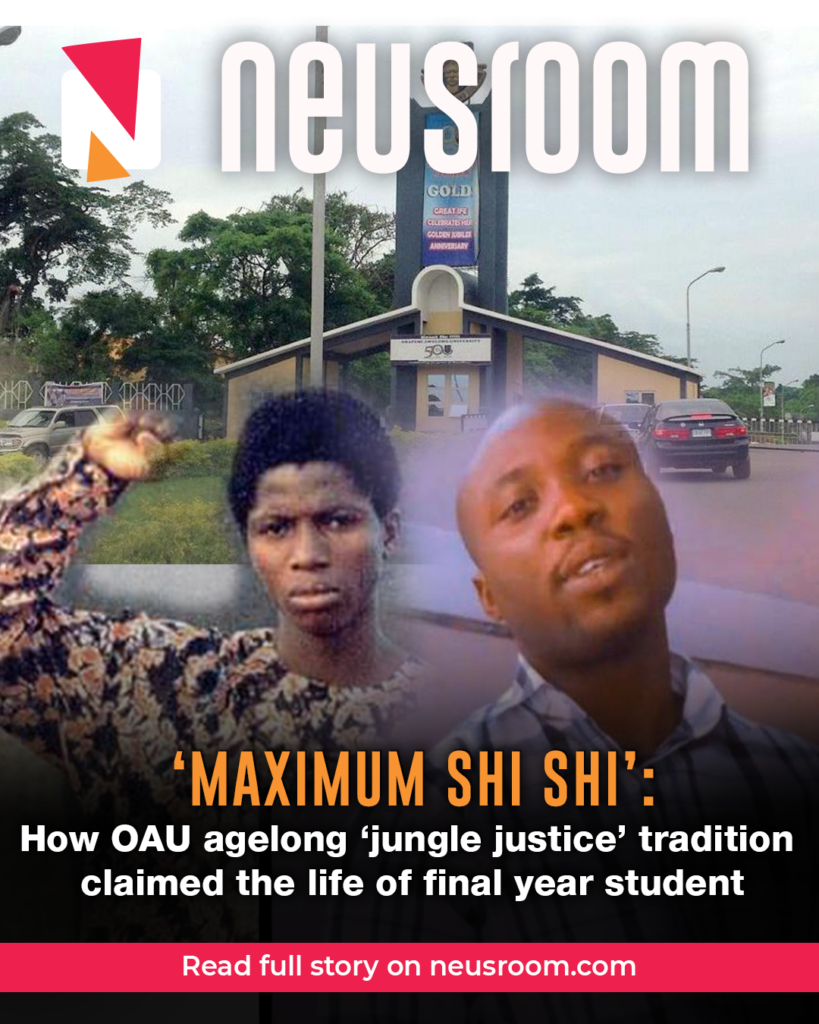
Written by Michael Orodare for Neusroom
May 3, 2023
Although no one has been able to trace its origin, the Maximum Shishi tradition of the Obafemi Awolowo University (OAU), for all its intents like, helping to curb cultism as some of the university’s alumni claimed, was bound to bring trouble. Even when that ‘trouble’ came earlier with the death of Patrick Umuna (a suspected cultist) in 1991 and George ‘Afrika’ Iwilade (a Student Union leader) in 1999, it only further energised the students to continue with the tradition which has been passed on to different generations of the institution for more than 30 years.
On Monday, April 10, 2023, Maximum Shishi raised a raucous ruckus in OAU with the death of Arinze Okoli, a Part 5 student of the university’s Civil Engineering department, who was allegedly beaten to death by a mob at the Awolowo Hall of Residence of the institution.
Okoli’s crime? He was accused of stealing a phone and in accordance with OAU’s SMS tradition, students at the Awo Hall descended on him. He didn’t survive the lynching.

Arinze Okoli: The death of the Part 5 Engineering student over allegations of phone theft has sparked debates about the agelong tradition, with many calling for its eradication. Photo: Facebook/OAU Great Ife Students.
“The student was declared dead on arrival at the Emergency Medicine Department of OAU Teaching Hospital this afternoon (April 11, 2023),” a statement by the Students’ Union President Festus Olayiwola said.
Since Okoli’s death made news headlines, some OAU alumni have been vocal in their condemnation of the act, with many calling for the eradication of SMS.
“This development is barbaric and shouldn’t have been allowed to happen. It really shouldn’t happen anywhere. It is bizarre that it happened in a supposed citadel of learning and culture. Whatever and wherever there can be no excuse for people to take laws into their own hands and engage in extra-judicial killing,” Lanre Arogundade, an OAU alumnus and Director of the International Press Centre, wrote on Facebook. “this is the time for the OAU students’ union and students’ unions elsewhere to drop such slogans as ‘pawon’, ‘shiwon’, ‘maximum shishi’, etc, all of which fuel the mentality of jungle justice.”
Origin of Maximum Shishi in OAU
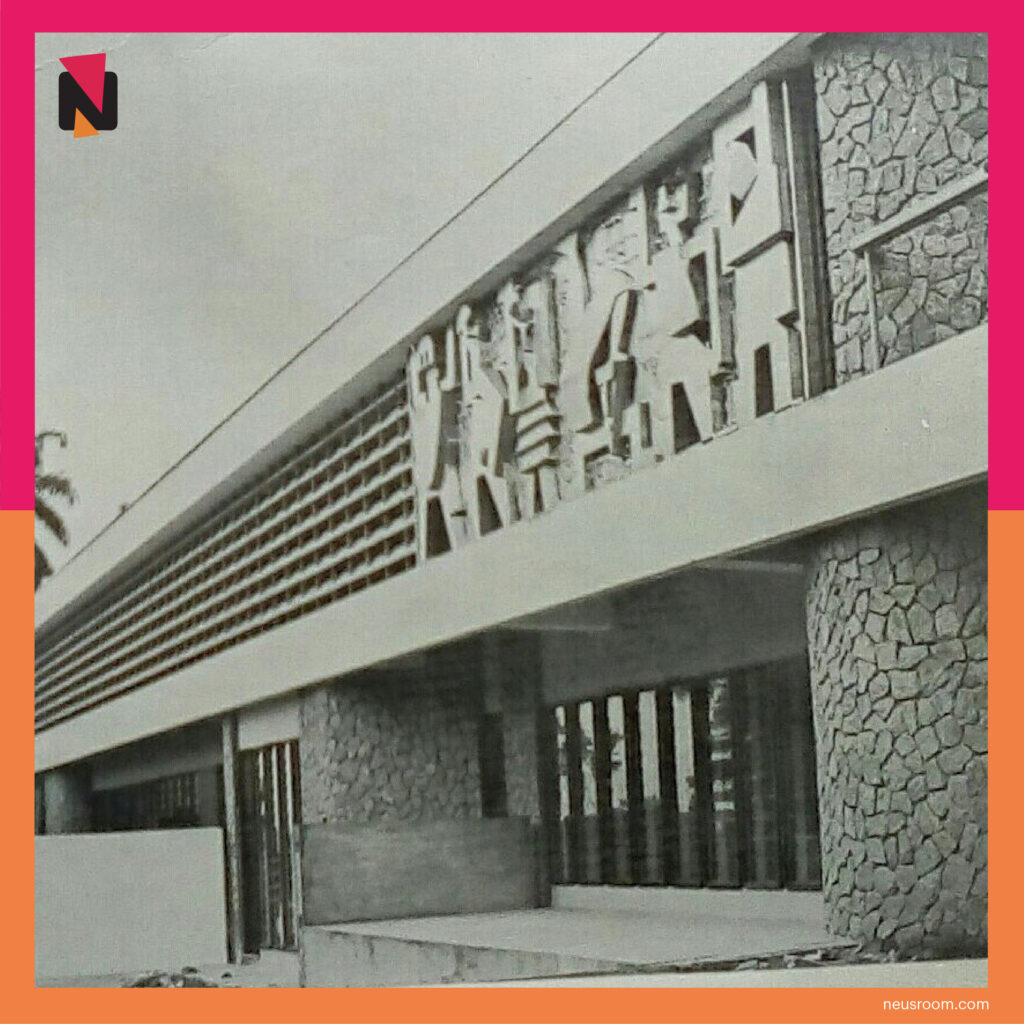
The OAU Student’s Union Building pictured in the 1970s showing the metal sculptures by Agboola Folarin of the Institute of African Studies. Photo: Twitter/Yoruba History
Maximum Shishi or Scientific Maximum Shishi’ (SMS) as Taofeek Ogunperi, the Public Relations Officer (PRO) of the OAU Students’ Union described it, is a phrase coined from English and Yoruba words. Shishi, a colloquial Yoruba word literally means to deal with someone by beating them. So Maximum Shishi means intense beating.
“It’s a tradition I met when I entered the campus in 1986, but then it was a bit controlled,” Comrade Adeola Soetan, OAU’s Students’ Union President in 1990, told Neusroom.
Soetan, who witnessed the first widely documented fatality of Maximum Shishi in OAU in 1991, was expelled thrice from the university, and spent 13 years on a five-year course. He told Neusroom that the SMS tradition was domiciled in Awo Hall which he described as OAU’s centre of activities and inherited traditions, but it was not called Maximum Shishi at the time.
A former leader of OAU’s students’ union in the early 1990s who would like to remain anonymous also told Neusroom that when known cultists are apprehended on the OAU campus during his time as an undergraduate, they are disciplined with a lot of moderation, but innocent students were never beaten.
Opeyemi Ajala, a Writer and Data Analyst, who graduated from OAU in 2006, told Neusroom that “there are four levels of Shishi – there is Fẹrẹfẹ (mild) Shishi, Medium, Maximum and Shishi Infinitua.”
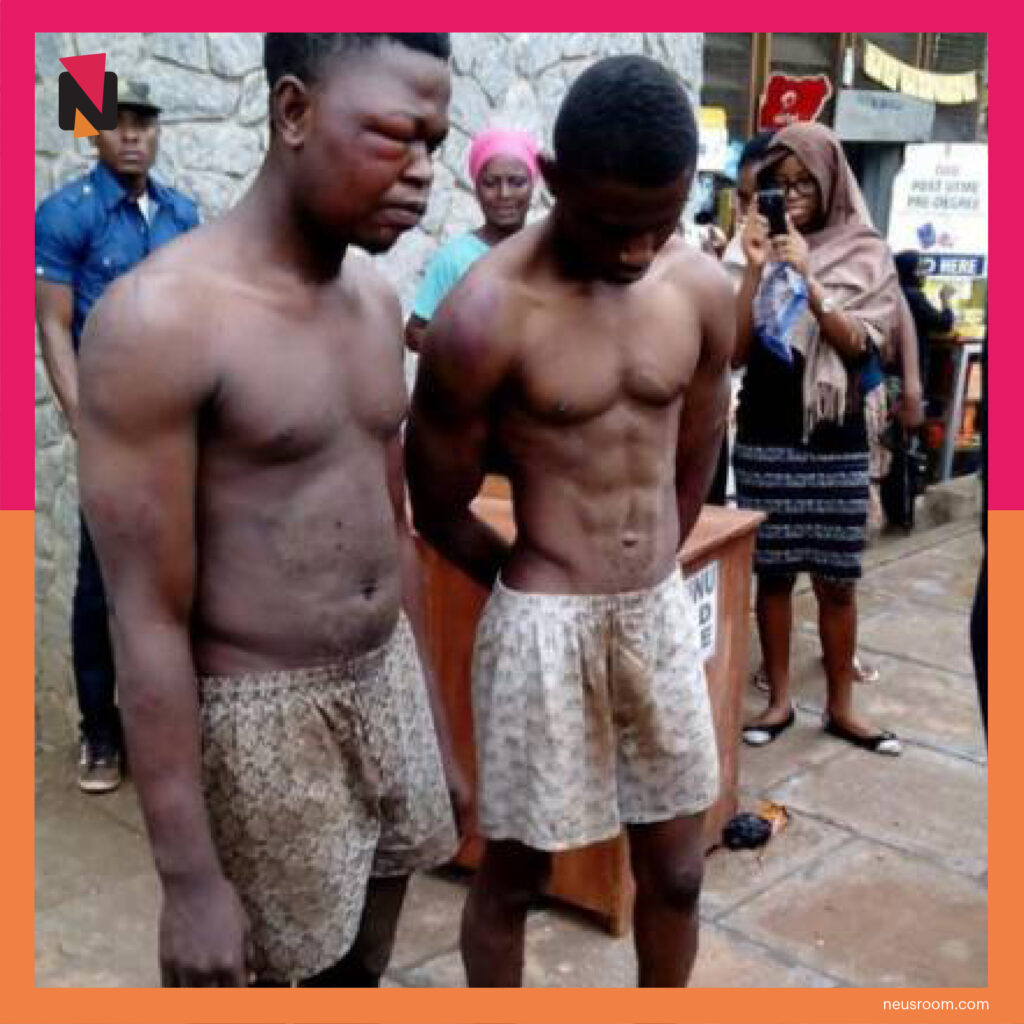
Two OAU students beaten to a pulp at Awo Hall by their colleagues over alleged theft in October 2015. Photo: Nairaland.
Ogunperi, the current PRO of the OAU students’ union told Neusroom that “SMS is empirical and must follow careful close examination and questioning before arriving at a decision. It is not just taking a suspect and punishing them unduly. It’s about identifying the truth and separating facts from fiction, and parading the suspect around the hall of residence with evidence of the crime committed.”
Israel Fagbemigun, a journalist who graduate from OAU in 2013, described SMS as “a time-honoured traditional practice designed to check several students’ excesses on campus, including stealing, fighting cultism, and many others. It’s always coordinated by student union leaders or Hall executives.”
Ogunperi and Fagbemigun believe SMS is not the same as jungle justice, but for Ajala, “the argument that SMS is not jungle justice is neither here nor there because what happens during SMS is basically interrogation in Guantanamo Bay style. They’ll be beating you and asking you questions.”
No one has been able to pinpoint its origin, but it is believed to have gained more prominence after the July 1999 killing of George ‘Afrika’ Iwilade, the former Secretary of the OAU Students’ Union.
“The reason SMS came into the students’ union is that students lost trust in security architecture and the justice system of society. So, they want to exert their own punishments before throwing the person into the system and let the system now work because they feel the system is corrupt,” Ajala said. “The voice of those against SMS was totally silenced by the killing of the OAU 5 on July 10, 1999. From then on, one of the worst things you can be called on OAU is a cultist, people will beat you before they allow you to say anything.”
The Story of Umuna, Afrika and OAU 5
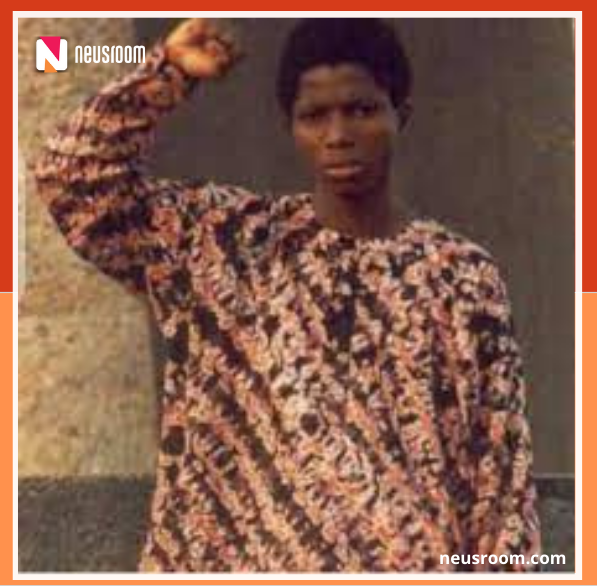
George ‘Afrika’ Iwilade: Afrika’s death is believed to have cemented the SMS practice as a tradition in OAU. Photo: Nairaland.
The first widely documented fatality of SMS was in 1991 when a suspected member of the Aiye cult group was lynched by the students.
“I was the outgoing President when it happened,” Soetan told Neusroom. “An election had been conducted but the incoming executives had not been sworn in.”
In May 1991, the National Association of Nigerian Students (NANS) ordered a nationwide student boycott of classes to demand an increase in students’ bursaries from N500 to N2,000. Two days after the notice of the rally was posted around OAU campus, the Aiye (Black Axe) cult posted a counter notice with red ink, warning the students against protesting.
“No Rally. No Congress. Be Warned! Blood for Blood,” Soetan said the notice by the cult group read.
On the day of the protest, as Soetan mounted a table to address the students, the cultists attacked him, but the students quickly intervened and guided him to his Room 273 at Awo Hall.
“About three of the cultists forced their way into my room, dragged me down and broke a flowerpot on my head. They brought out a knife threatening to get me out of the campus. I never expected anybody to do that in Awo Hall, especially during my tenure. When the students realised I was being attacked, they came to my rescue, and were able to overpower the cultists who fled. I was advised to stay back at the hostel since I was the target, while the students went after them.”
There was chaos on the campus. The unrelenting students chased one of the suspected cultists – Patrick Umuna – to the Students’ Union Building where he reportedly flung bottles to disperse them and injured many. The students overpowered him, unfortunately, he died of injuries while being taken to the teaching hospital.
“Immediately after that incident, there was a lot of caution. When cultists are arrested, people would just beat them here and there and hand them over to management,” an OAU alumnus who witnessed the incident told Neusroom.
Umuna’s death led to the arrest of Soetan and other students who spent seven months in prison (June 1991 – January 1992).
Although there is no information about Umuna on the internet, we visited the library of two national newspapers to review newspaper publications from 1991 reporting the crisis. Our findings revealed that Umuna was a Part 4 Philosophy student at the time he died.
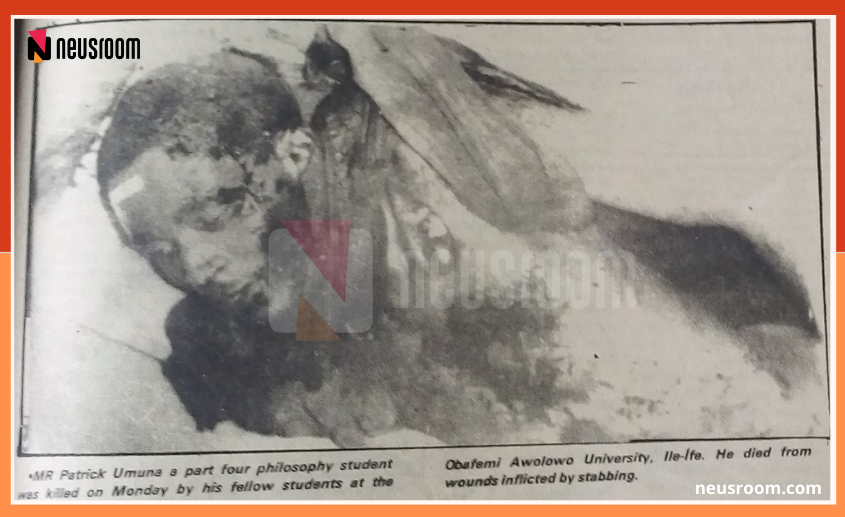
The body of Patrick Umuna on the front page of Nigerian Tribune newspaper on Thursday, May 30, 1991. Photo: Nigerian Tribune Library.
The ugly incident reared its head again in 1999 between Aiye cult members and the students.
In March 1999, OAU Students’ Union leaders claimed they apprehended a group of students allegedly caught in the process of being initiated into cultism on campus.
“In Ife, it’s easy to know a cultist, everybody is against cultism, so once you’re a cultist people point you out easily,” an alumnus told Neusroom.
The then Students’ Union president, Lanre ‘Legacy’ Adeleke told Punch newspaper that the students who were caught with guns in March 1999 had confessed that their patron was the then vice-chancellor, Prof Wale Omole.
Legacy said he was not on campus during the operation, which was led by Afrika and Saka Muhammed, the then Speaker of the Students’ Representative Council. The duo with other students took the suspected cultists to the police station at Moore in Ife town. They decided not to hand them over to the school security due to the allegations against the VC.

Marked in red: A report about the OAU May 1991 crisis on the frontpage of Nigerian Tribune newspaper – June 1, 1991. Photo: Nigerian Tribune Library.
According to Legacy, the suspects were arraigned before a court and acquitted in three days. To their surprise, three months after the incident in June 1999, the suspected cultists returned to campus contrary to the expectations of the students that they would be expelled.
The Students’ Union called the attention of the management to the development and warned that the suspected cultists’ presence on campus was a security threat, but nothing was done about it. On the night of July 9 and the early hours of July 10, 1999, Aiye cult group members, who had been mobilised from different institutions to OAU, went on a rampage on the campus, killing five students including Afrika, to avenge their humiliation by the Students’ Union leaders.
Another alumnus told Neusroom, “Over the years, when caught and confessed cultists are handed over to the school management by the students, they return back to school with no explanation from management.”
The perceived lack of accountability in the management of cultism-related issues by the school authorities is believed to have given rise to SMS.
“If management is going to take back known cultists, there should be an interaction between management and students, explaining the condition of reabsorption of such students. More often than not it doesn’t happen. You just see them on campus,” a former students’ union leader told Neusroom.
Abiodun Olanrewaju, OAU’s spokesperson, was unavailable for comments.

Left: Adeola Soetan disguised as a local auto mechanic to beat security operatives drafted to OAU gates and campus and gain access into the campus in 1992 to address students after his release from prison. Right: A recent photo of Soetan. Photo: Facebook/Adeola Soetan.
Afrika’s death, which remains unsolved, eroded the confidence the students had in the school authority and the Police.
“After Afrika’s death, the SUG had to take some measures that became traditions on the OAU campus in order to keep the campus safe and sane,” Ogunperi, the current students’ union PRO, told Neusroom.
One of those measures was the setting up of the security committee of the Students Union’ which handles cases of anti-social vices among the students and transfers suspects to the school security unit.
Ogunperi believes the SMS tradition has helped to reduce the level of anti-social vices and curbed cultism on the OAU campus, unlike what is obtainable on other campuses across the country.
“If you look at the history of the 90s and the early 2000s, Ife relatively had little cultism when juxtaposed with other notable higher institutions like The Polytechnic Ibadan, Federal Polytechnic Ede, and the University of Ibadan,” Ajala said.
In 2019, Ike Onyechere, the founding Chairman of a Non-Governmental Organisation (NGO) – Exams Ethic Marshall International (EEMI), said “Over 40 different cult groups, with a total of over 12,000 chapters, operate in school campuses across Nigeria. These gangs have killed at least 10,000 people between 1996 and 2019.”
Neusroom could not independently verify this claim.
But Ajala said there had been instances where student unionists used SMS against their opponents.
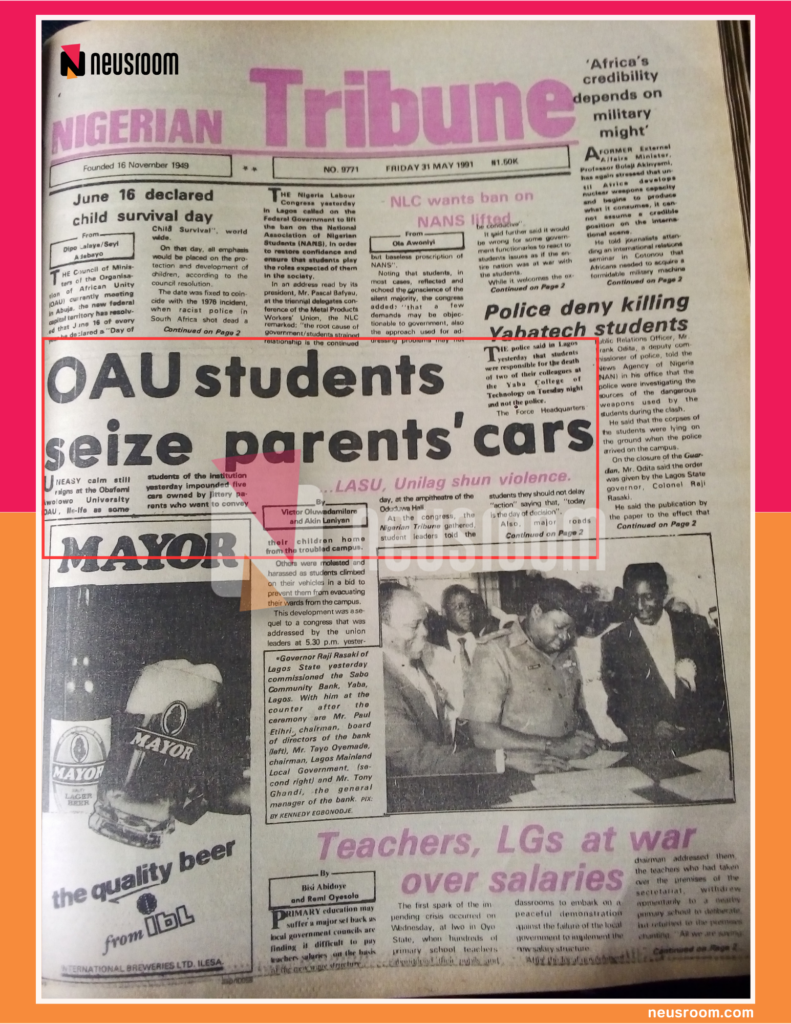
A report about the 1991 crisis on the frontpage of Nigerian Tribune newspaper – May 31, 1991. Photo: Nigerian Tribune Library.
“I saw this in 2004,” Ajala said. “One night at Awo Cafe, the parliament was sitting, and one guy had raised a point that had ruffled the feathers of one of these ideological groups during the parliamentary sitting. He went underneath the buttery where they used to play snooker, and somebody just came and accused him of being a cultist from the sitting and the next thing somebody actually removed the fluorescent tube and hit the guy on the head. The guy was running with it to his room, and they started shouting in the middle of the night, around 1 am – ‘Cultist! Cultist!! As he was trying to run to his room, people came out, even people from his own floor who knew this guy and bath in the same bathroom with him, came out and were beating this guy as he was running to his own room.”
How Okoli became a victim
“At about 10 pm on Monday (10th of April, 2023), One “Arinze” was caught by a group of people in Awolowo Hall of residence for stealing a phone and also using the bank app on the phone to make transactions and it was also observed that he went as far as messaging the relatives of the legitimate owner of the phone to request for funds,” a statement by the Awolowo Hall Of Residence Security Committee said.
“After all of these, the entire Hall was thrown into disarray. And a mob gathered to beat him up and the so called “Arinze” tried to retaliate at the mob. He got a beating by the mob. The Executive Council of the Hall of Residence then intervened by transferring the young man to the Security Committee of the Union to avoid any harm and further assault from the mob.”
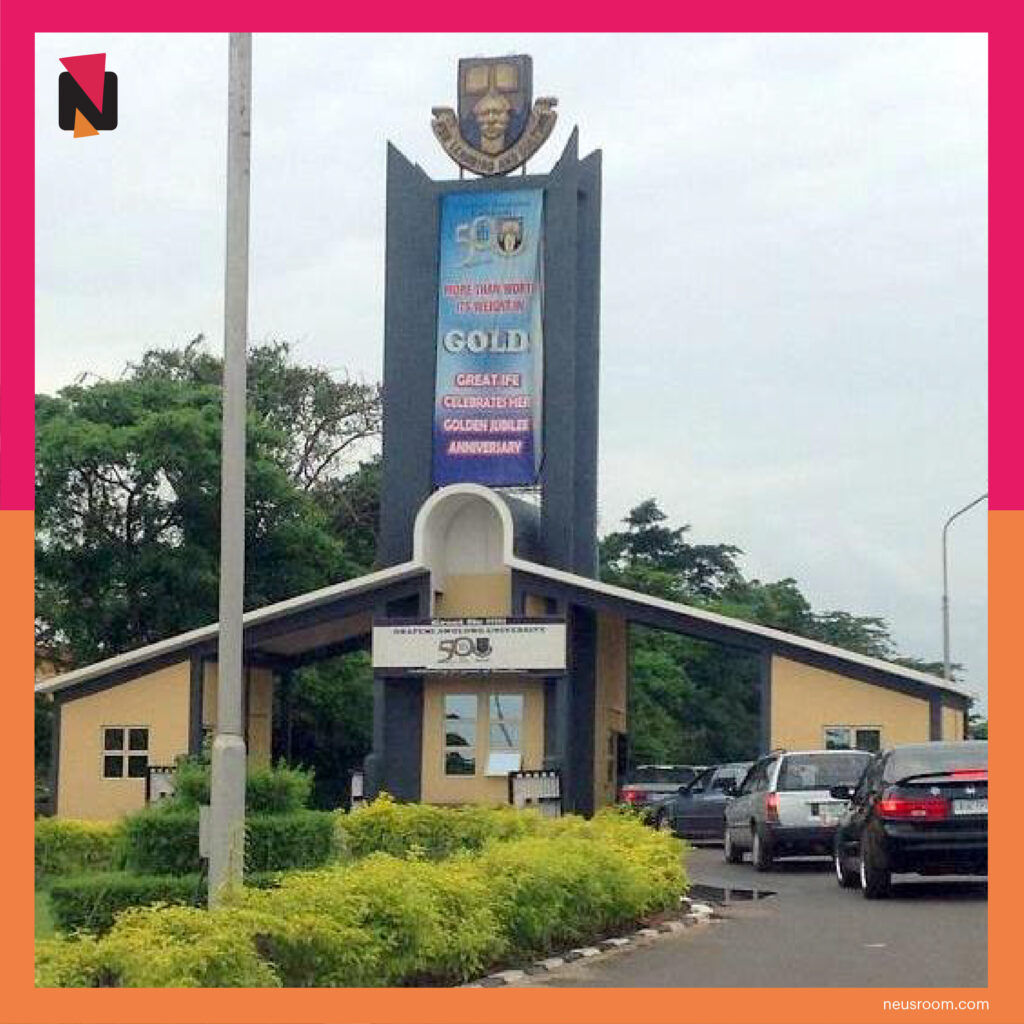
Obafemi Awolowo University. Photo: OAU.
Ogunperi told Neusroom that Okoli “would have been transported to the hospital immediately he was taken to the SUB but all our vehicles had broken down and were at the maintenance unit. There was no other option than to keep him till the morning before he was taken to the OAUTH where he was confirmed dead on arrival.”
How did Okoli’s case get out of hand?
The Awo Hall of Residence executives and the Students’ Union leaders have been trading blame over Okoli’s death. While the hall executives claimed Okoli walked into the SUB himself, the union leaders said he was carried there in a wheelbarrow and denied claims that he was tortured at the SUB.
“If there’s an issue, and it is noticed that the health of the suspect is being undermined, the first thing we do is to take care of the person. Sometimes, we even buy them food,” Ogunperi said. “Our facility at the security committee of the SUB is not a cell. So it wasn’t that the place was bad and led to his death. He had been beaten and carried in a wheelbarrow to the SUB.”
Ogunperi told Neusroom that it was not the first time Okoli would be accused and punished for a crime.
“In fact, this particular student had committed crimes on different occasions in the past and was handed over to university security,” Ogunperi said.
The Students’ Union and the Technology and Engineering Students’ Association (TESA) in separate statements claimed that they were informed that the Awo Hall executives refused to release Okoli to the university’s security unit when they demanded his handover after he was apprehended.
Attempts to speak with the President of Okoli’s departmental association – the Nigerian Institution of Civil Engineers Students’ Affiliate – OAU, proved abortive. The President who had initially indicated interest to speak to Neusroom has stopped responding to WhatsApp messages sent to him.
SMS and Jungle Justice
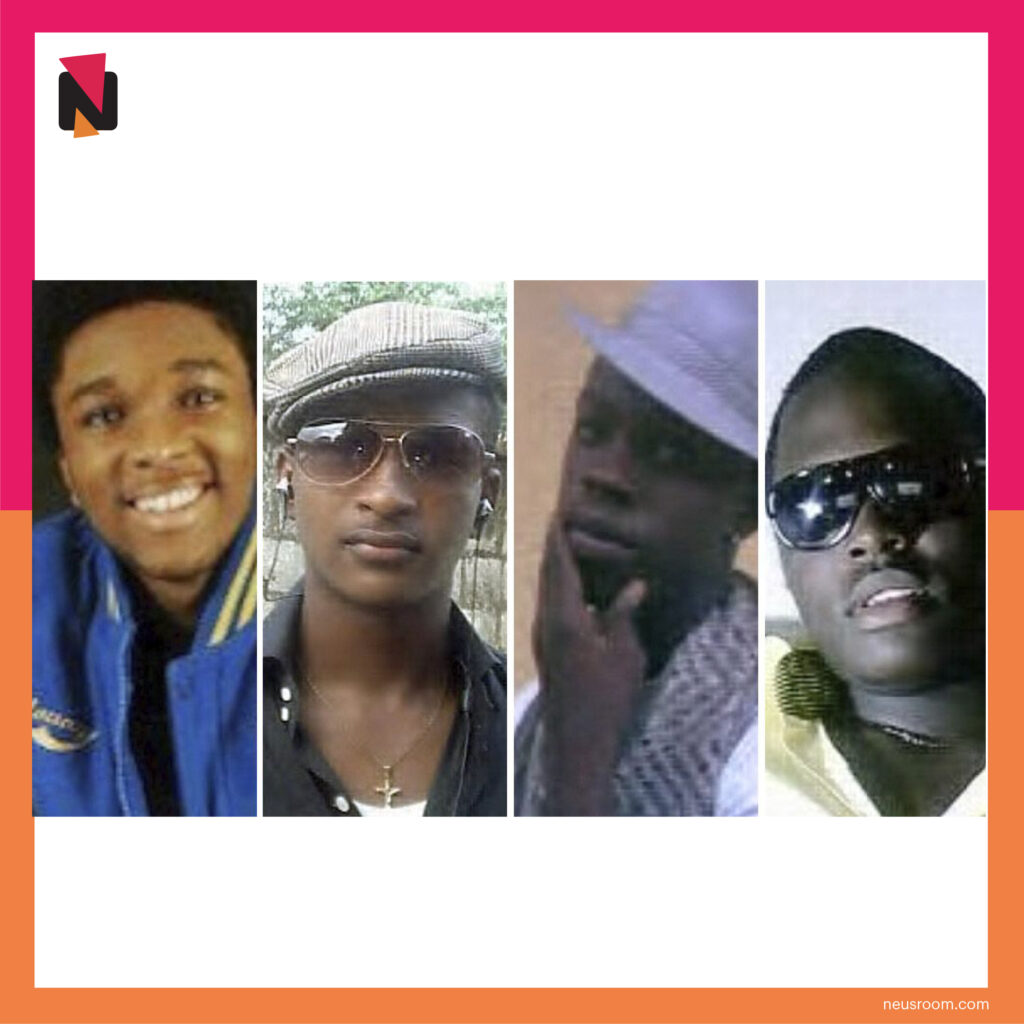
ALUU 4: Four students of the University of Port Harcourt, Rivers, lynched over alleged theft. Photo: BBC.
Although the SMS tradition has the signatures of jungle justice which is rampant in Nigeria, some OAU alumni and students disagree.
A report by SB Morgen (SBM) Intelligence in 2022 says at least 391 persons were killed by mobs across Nigeria between 2019 and May 2022. Lack of confidence in constituted authority and the judicial system has been described as the major reason why citizens take laws into their own hands.
A survey by NOI Polls in 2014 revealed that 51% of Nigerians attribute the high prevalence of jungle justice in the country to a “lack of trust in the law enforcement agencies”.
In the case of OAU, many believe the school management and Police have lost the confidence of the students after suspected cultists handed over to them were set free without disciplinary actions.
Another former union leader said “when a habitual thief is apprehended once or twice, the management ought to take action because what it does is create a system where there is no punishment. I do not subscribe to extrajudicial killings but once there’s no justice, justice in the form of extrajudicial punishment will have its way in society.”
Ogunperi said sometimes when students are accused of theft, “the penalty is community service or other things you wouldn’t want to do ordinarily. In recent times, we have handed some of the accused over to the University’s security unit or Police to serve as a deterrent to others.”
Has SMS helped to curb cultism?
Some alumni of the university who spoke to Neusroom believe the practice is responsible for the absence of cult-related activities in OAU.
“Yes, it helps, but it is barbaric,” Ajala said. “Part of the orientation you are given as a new student at OAU is that if you are being ‘toasted’ by any cult member, walk to the SUG building and report, they will find the person and give him ‘Shishi Infinitua’ and they will use that person to get all other cultists. We’ve also seen where OAU ladies were sexually molested or harassed outside the campus, some raped and SUG boys will go and pick these guys.”
Future of Maximum Shishi at OAU and Fear of Cultism

Okoli’s death, which has led to the arrest of two suspects, has increased calls for the eradication of SMS.
We sent messages to the Osun Police PRO, Yemisi Opalola, on April 22 and 25, 2023, to ask for update about the case, she’s yet to respond.
The Students’ Union PRO admitted that there’s a need for reform and reorientation of the students on Maximum Shishi tradition. “If people have a better understanding of it and the possible consequences of doing certain things, I believe things will be better. What is needed is more orientation and vigilance on campus.”
Ajala believes it can only stop when confidence is restored in the criminal justice system.
“It has endured all these generations for a particular reason, and it is just sad that the Nigerian state does not seem to be getting the criminal justice system correctly anytime soon,” he said. “For instance, what happened to the cultists that were caught on the night that Afrika was killed? They were discharged and acquitted. I think one or two others served some years in jail and they’ve been free since. So, the belief that the criminal justice system does not give a fair trial or justice is not served engenders SMS.”
Some former student union leaders of the university who spoke to Neusroom also argued that eradicating Maximum Shishi when confidence has not been restored in the Nigerian justice system “may just be providing a temporary solution that may not lead us anywhere.”
“The culture of Maximum Shishi should be looked into. Maybe the name should be changed, instead of the shishi mentality,” Soetan said.
Story: Michael Orodare
Additional Reporting: Anjolaoluwa Abiosun
Cover Design: SamJoe Mbanefo

